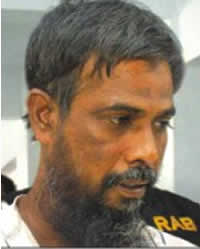 A Dhaka court yesterday finally framed charges against detained former BNP lawmaker Abdus Salam Pintu, Harkatul Jihad (Huji) chief Mufti Abdul Hannan and 20 others in two cases filed for grenade attacks on an Awami League (AL) rally in August 2004.
A Dhaka court yesterday finally framed charges against detained former BNP lawmaker Abdus Salam Pintu, Harkatul Jihad (Huji) chief Mufti Abdul Hannan and 20 others in two cases filed for grenade attacks on an Awami League (AL) rally in August 2004.Judge Mohammad Masdar Hossain of the Speedy Trial Tribunal-1 also rejected the discharge petitions of Pintu, Hannan and 12 others in jail custody.
The court fixed November 5 for trial of the cases--one for murder and another for bomb blast--and summoned the complainant to appear before it on that date.
The grenade attacks on the AL rally on Bangabandhu Avenue on August 21, 2004 left 24 people including Ivy Rahman, wife of acting AL President Zillur Rahman, killed and 200 others including AL chief Sheikh Hasina injured.
Charges were framed in the cases after hearing had to be adjourned on nine consecutive dates following tie petitions from both the prosecution and defence. Both the cases were earlier shifted to the tribunal for quick disposal following a home ministry order.
In the murder case, charges were framed against all the 22 accused under sections 307 (attempt to murder), 326 (grievous hurt), 324 (causing hurt), 109 (abetment), 34 (criminal liability), 120(B) (criminal conspiracy) and 302 (murder) of the Penal Code. Bomb blast charges were framed against them under sections 3, 4 and 6 of the Explosive Substances Act.
The court charged Pintu also with approving the plan of the grenade attack prepared by Hannan and his accomplices. The former BNP lawmaker was also charged with assisting the Huji men with finances and administrative help and abetting them for killing and injuring the victims.
Pintu, Hannan and 12 others, who are now in jail custody, pleaded not guilty and demanded justice after the charges were read out to them. Eight accused have been absconding.
The 12 accused in jail are Hannan's brother Mohibullah alias Mafizur Rahman alias Ovi, Sharif Shahidul Islam alias Bipul, Maulana Abu Sayeed alias Dr Abu Zafar, Abul Kalam Azad alias Bulbul, Jahangir Alam, Maulana Abu Taher, Shahadatullah Jewel, Hossain Ahmed Tamim, Mufti Moinuddin Sheikh alias Abu Zandal alias Masum Billah, Arif Hasan Sumon, Rafiqul Islam Sabuj and Mohammad Ujjal alias Ratan.
The eight absconding accused are Pintu's brothers Maulana Tajuddin and Maulana Liton, Anisul Mursalin and his brother Mahibul Muttakin, Iqbal, Maulana Abu Bakar alias Selim Howlader, Jahangir Alam Badar and Khalilur Rahman.
Charges were framed against them in absentia and their trial will be continued in their absence.
During the investigation of the cases, Hannan, Bipul, Ovi, Abu Sayeed, Bulbul, Arif Hossain, Jahangir and Sabuj gave statements under section 164 of the Criminal Procedure Code (CrPC) confessing their involvement in the grenade attack.
Special Public Prosecutor Firoz Kamrul Hassan and advocates Syed Rezaur Rahman, M Sajwar Hossain and Saharar Khatun appeared for the state during yesterday's hearing.
THE CASE
The police filed the two cases with Motijheel Police Station a day after the grenade attack.
On June 5 last year, Badar Aziz Uddin of Cox's Bazar filed another case with the Chief Metropolitan Magistrate's Court, Dhaka, charging former premier Khaleda Zia, her son Tarique Rahman, Jamaat-e-Islami Ameer Motiur Rahman Nizami and 25 others with murder.
However, the investigation officer of the case, Criminal Investigation Department Assistant Superintendent Fazlul Kabir, did not find any links of them to the incident.
On June 11 this year, the investigation officer of the two cases submitted the charge sheets, accusing the 22 persons in each case.
The charge sheets contain 42 pages each while the case dockets have more than 3,000 pages. A total of 408 persons, including Hasina and other top AL leaders, have been made prosecution witnesses in the cases.
Besides, 69 types of evidence including Hasina's sports utility vehicle, the truck used as the makeshift podium at the rally, grenade splinters and blood stained clothes were submitted.
